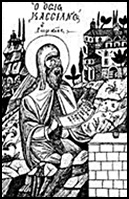MOTHER MARIA (GYSI)
 I see in humility, and the never-ceasing repentance of what we are perpetrating on the one side of ‘world,’ precisely the unity of mind and heart, or the descending of the mind into the heart, as an attitude. I intensely reject the idea of any esoteric side to the Christian or to the monastic life. What is esoteric (or made so, to sound interesting) must be unchristian and anti-Gospel; and there is never a sign of it in our liturgical texts, which, I think, must be our first guide after the New Testament. They shape us unawares and uncramped, and we must not force ourselves beyond that. The most important things are given us, where we least expect them; and they are, perhaps, if we could see, all the while most abundantly there where we feel ourselves shut out.
I see in humility, and the never-ceasing repentance of what we are perpetrating on the one side of ‘world,’ precisely the unity of mind and heart, or the descending of the mind into the heart, as an attitude. I intensely reject the idea of any esoteric side to the Christian or to the monastic life. What is esoteric (or made so, to sound interesting) must be unchristian and anti-Gospel; and there is never a sign of it in our liturgical texts, which, I think, must be our first guide after the New Testament. They shape us unawares and uncramped, and we must not force ourselves beyond that. The most important things are given us, where we least expect them; and they are, perhaps, if we could see, all the while most abundantly there where we feel ourselves shut out.
December 16th, 1974
A cancer never leaves one. It has entered one’s soul and every day is an extra gift. I find it a peaceful condition, because it keeps one’s soul on the watchtower, where it anyway wants to be, and so is an immense help for life.
Mother Maria: Her Life in Letters (pp. 56,59)
Edited by Sister Thekla







